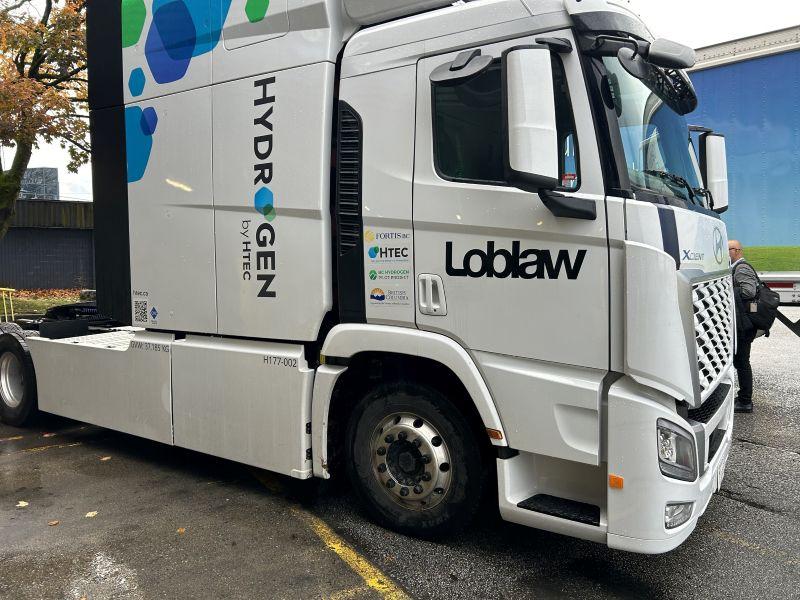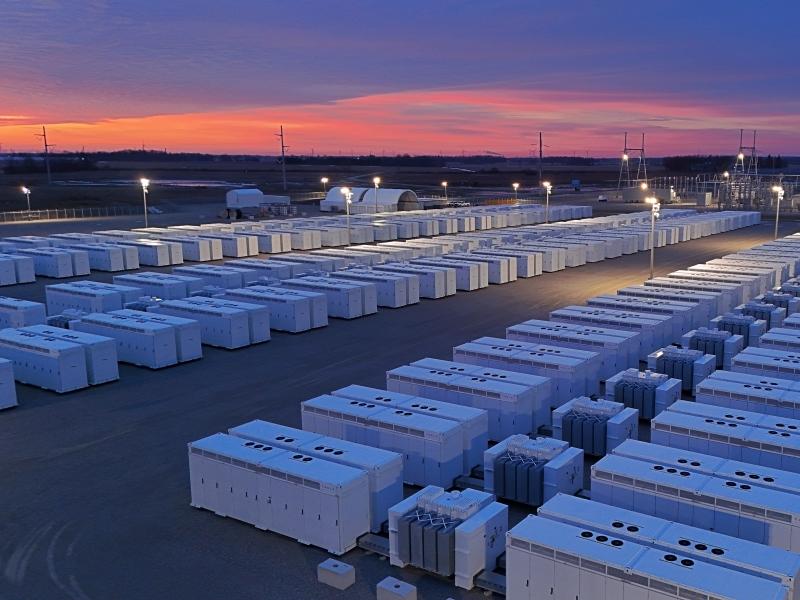
A Loblaw (L-T) grocery delivery truck that has been making its rounds in Vancouver since mid-October is one of the first Canadian retail fleet deployments of a Class 8 hydrogen fuel-cell electric truck in active commercial service.
The Hyundai XCIENT truck has been servicing the grocery company’s operations from the Lower Mainland to Squamish in a multi-partner demonstration project. The pilot will continue until late November, providing information on the performance, fuelling and operating conditions of the truck in routine service.
The data will supply insights for the potential of hydrogen vehicles and hydrogen fuel infrastructure development in British Columbia, Jamie King, FortisBC’s director of innovation, said in an interview with Sustainable Biz Canada. The utility company’s Clean Growth Innovation Fund contributed $30,000 toward the project.
Partners in the demonstration include:
- Vancouver-based hydrogen fuel producer and vehicle leaser HTEC, which provided the truck and supplies the fuel;
- Transport Canada's Zero Emission Trucking Program, Deloitte and the Alberta Motor Transport Association supporting the data collection and analysis; and
- the British Columbia government’s Innovative Clean Energy Fund.
“I think everyone in the industry really sees hydrogen as (having) potential for low-carbon transportation in the future” and displacing diesel-fuelled trucks, King said.
The aim of the demo
Loblaw chose to pilot a hydrogen-powered truck because it offers the possibility of a longer hauling range compared to battery-electric models, King explained. The grocery company can compare and contrast the two kinds of low-carbon transportation, he continued, and better understand how hydrogen-fuelled vehicles can fit into its fleet.
The demonstration is being held in the Lower Mainland because of the established hydrogen fuelling infrastructure and the integrated support network of HTEC, the company's fleet services administrator Tracy Dechaux told Sustainable Biz Canada in an email exchange.
“The region’s return-to-base delivery routes are ideal for early hydrogen fleet adoption,” she said.
The XCIENT truck has a gross vehicle weight of over 37 tonnes and can carry enough hydrogen fuel for a range of over 700 kilometres, depending on load and terrain, according to Dechaux. To date, it has travelled over 2,500 kilometres.
The truck is refuelled at HTEC's Southeast Marine Drive hydrogen station in Vancouver. The fuel is made by splitting water with low-carbon electricity.
The truck drivers were trained in hydrogen station safety, pre-trip examinations and vehicle operation by HTEC and Hyundai, Dechaux said.
King has not heard of any major challenges with the truck’s operations. “While there may be some slight changes in process, it really wasn’t anything too concerning,” he said.
Loblaw has interest in low-carbon trucks
Loblaw is not new to low-carbon trucks. In 2023, it rolled out its first heavy-duty electric transport truck, and announced a plan to purchase five Class 8 hydrogen fuel cell trucks from Kenworth.
The low-carbon transportation helps the company move closer to its goal of being net-zero across its enterprise operating footprint by 2040.
As of the end of 2024, Loblaw had 20 heavy-duty electric transport trucks in its fleet, according to its latest sustainability report. It also had more than 130 electric or hybrid vehicles, making up approximately 10 per cent of its corporate fleet.
Loblaw joins Walmart in deployment of a hydrogen-powered truck for retail use. In 2024, Walmart unveiled a hydrogen vehicle which is deployed in Mississauga.
FortisBC interested in more projects of the kind
The demonstration marks the next step in FortisBC’s strategy to explore low-carbon, scalable technologies, King said.
“We hope it facilitates more adoption and more people working towards using these lower-carbon fuels.”
As the transportation sector is responsible for approximately 30 per cent of British Columbia’s greenhouse gas emissions, FortisBC sees an opportunity to reduce that pollution with technologies like hydrogen-powered trucks, he added.
The utility company is looking to participate in more projects that have the potential to reduce greenhouse gas emissions in the province, King said.










